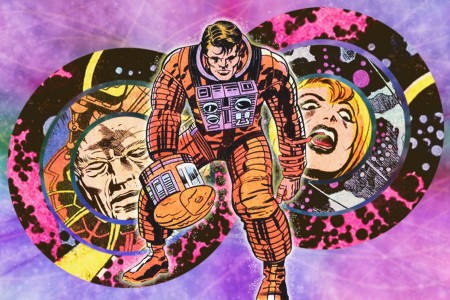Jack Kirby: Storyteller
Today I watched a sick Jack Kirby documentary by Paul G Baker. Some of comics most well-known creators weigh in on the man who far too often resides in the shadow of Stan Lee. If you have any interest in the history of comics, superheroes, or the far-reaching effects one man can have on a medium, watch this feature.
[EDIT: 2/27/11]
The comments section has been visited by some individuals curious about Jack Kirby’s wartime experiences. Hoping to add the little insight I have to the dialogue, I present an excerpt from Warren Ellis’ astonishing DO ANYTHING:
Since I began writing this, other comics creators have come to me with stories of Jack. Jack the angry man, Jack the wall-puncher, Jack the bitter man, Jack the betrayed. Jack the furious, who never raised a hand to anyone but never left any building he resided in without the pockmark of fist-shaped holes, they say. He was all these things, people tell me. And there’s the thing that is mentioned without being mentioned, if you see what I mean: Jack the killer. When we write that Jack went to war, and Jack was in the field of combat, what we mean is that Jack took a gun and killed people he didn’t know. We make it a small thing, a historical footnote. Particularly us, me, my generation and the generations around mine who’ve lived in what we call “peacetime.” We’ve never been conscripted, we’ve never had to fight a war, particularly not a world war against an evil we have since defused through parody, an enemy safely consigned to a past by defeat and death. [41]
– how does Jack Kirby go from the kid from the Lower East Side to the guy who moved inexorably towards drawing nothing but angels and gods?
And yet, here’s Kirby’s Fourth World, featuring Orion, whose ordinary placid human face is a facade of technology hiding a shorter, stockier man who is nothing but fury, an angry man who can kill. And whose ultimate villain, the enemy of life, the actual Dark Side of humanity is a figure of awe and religious terror. The key Fourth World story is “The Glory Boat,” from New Gods. It is, in Kirby’s typically blunt, slightly clumsy and off-kilter way as a writer, a rumination on the concepts of heroism, pacifism, and sacrifice. It is perhaps notable that someone therein dies as a faceless soldier. (42)




